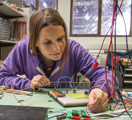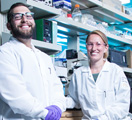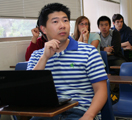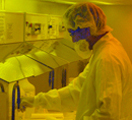







Graduate studies in the Electrical and Computer Engineering (ECE) department at UCSB are broad and encompass many diverse areas such as computers and digital systems, control, communications, electronics, signal processing, electromagnetics, electro-optics, physics of electronic devices, and device fabrication.
As in most areas of engineering, knowledge of mathematics and the natural sciences are combined with engineering fundamentals and applied to the theory, design, analysis, and implementation of devices and systems for the benefit of society.
Graduate studies leading to the M.S. and Ph.D. degrees are offered in three major program areas of research.
Note: the ECE department research area of Control Systems is combined with Communications and Signal Processing.
Graduate students determine and choose their program of study. Each student will work with a faculty advisor, whose technical interests coincide with those of the student. Faculty advisors are available for consultation and guidance in course selection and matters related to the student's technical program.
All graduate degrees have a set of requirements that must be fulfilled for UCSB to grant a degree:
Degree requirements for the three ECE program areas are intended to be flexible so that the program of study can be tailored as much as possible to the needs and interests of the student. The student may petition for a variation or waiver of any given requirement.
Requirements are sometimes altered to accommodate for technical, academic, or administrative changes. However, students are held to the requirements in effect when they enter the ECE graduate program unless they have written permission for an exception by either applicable area - the UCSB Graduate Division or the ECE Department.
Further information on requirements and procedures may be obtained from the UCSB Graduate Division, ECE Graduate Student Office, and the Masters of Science and Doctor of Philosophy sections of this website.
The student is also expected to read relevant sections of the following publications:
All past and present year publications are also available for reference on the Graduate Student Resources page.
Additional info about financial support can be found on the ECE Graduate Student Resources page.
![]()
Hometown: Ridgefield, CT
Area: Electronics & Photonics
Main research area: Photonic Integrated Circuits
Advisor: Prof. Clint Schow / Optoelectronics Tech. Ctr (OTC)
Tell us about your research: I work on two main projects that fit under the general theme of developing Silicon Photonic Integrated Circuits for data center applications. With the continued global increase in demand for more data and most of the global IP traffic occurring in the data center, we will need to move towards faster communication links in the data centers. Both my projects look to address how we transport increasing data rates in an energy efficient manner. The first project was funded through AIM Photonics and is developing a wavelength-selective silicon photonic switch. I have designed ring-based switches with special care taken to make sure that it can be driven by a custom electrical IC and that it is compatible with standard methods of introducing electrical and optical signals. The second project is funded by ARPA-E that aims to develop analog coherent optical links. This includes InP and Si PIC transmitter and receiver development. I design and test Si photonic Mach-Zehnder modulators on this project and on the system analysis of the energy efficiency of the links.
In addition to those two main projects, I am also involved in a project for free space optical link for cryogenic operation, which has involved designing and testing silicon ring modulators.
What do you find rewarding about your research? Knowing that I’m working on relevant, tangible, real-world problems is the most rewarding aspect of my research. It’s doubly rewarding when someone at a company, for example, contacts you asking to know more about the details of your project.
"Mentoring is the number one role of a professor, but we’re researchers and we’re teachers. Students need to navigate both a complicated technical world as well as a broader society. I mentor undergraduates who are trying to understand the field for the first time, but also who want to understand the context for the material in the world we live in. It’s important to me to be a role model for students, so they understand who engineers are and what they do."
More questions from Prof. Buckwalter's interview:
Department of Electrical and Computer Engineering • University of California, Santa Barbara
Copyright © 2019 The Regents of the University of California, All Rights Reserved.
UC Santa Barbara, Santa Barbara CA 93106-9560
Site Information • Terms of Use • PrivacyLast Modified 5/20/20